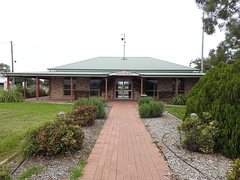Regional building blocks need urgent attention – RAI
Paula Doran
11 December 2024, 8:30 PM

Community leaders in the west have backed calls by the Regional Australia Institute (RAI) which say the fundamental building blocks to support inland growth need serious attention.
The RAI released their new figures on regional migration last month, reporting that the number of city residents looking to relocate to the regions has doubled in the past 18 months.
But those figures have come with an urgent need to address the challenges facing regional growth, according to the RAI.
The results of a nationwide survey shows 40% of capital city residents are considering a move to regional Australia – up from 20% in May 2023.
RAI CEO Liz Ritchie said the research should ring alarm bells for policymakers, industry and regional leaders.
“Demand for regional living has never been higher, but as a nation we are not keeping pace with delivering the fundamental building blocks that are needed as we rebalance the nation,” Ms Ritchie said.
The new market research comes at the same time as the release of the RAI’s Year 2 Progress Report on the Regionalisation Ambition, which shows key regional metrics tracking housing, education and migration have gone backwards over the past 12 months, including:
- The regional rental vacancy rate decreasing (1.3% in 2024 v 1.5% in 2023).
- Regional building approvals declining (down 9.4% between May 2023 and May 2024).
- The regional student school attainment rate dropping (67.3% in 2022 v 71.4% in 2021).
- The percentage of migrants settling in the regions falling (16.5% in 2022/23 v 18.6% in 2021/22).
“Regional Australia is simultaneously experiencing two unprecedented transformations – a once-in-a-lifetime population shift and the net zero transition, which is increasing demand and need for improved services and infrastructure in regional communities,” Ms Ritchie said.
“Falling behind on critical targets is not in the nation’s best interests and we can’t afford to squander this opportunity to better our country.
“Many regions are already struggling with housing, particularly rental markets, and until region-specific policy measures are put in place, this will only be further magnified.”
The regions agree
General Manager of Walgett Shire Council, Megan Dixon agreed with those calls. “Housing and education are complex issues. In a town like Walgett there is often not the stock that is readily available for those moving to the region. Or the rentals might be available by word of mouth.
“But there are some organisations who provide housing to staff as part of their package,” she said.
“It’s an issue that the Government needs to pay attention to. We may only be small scale, but any change or improvement to their policies which make it easier for people to access the housing market here will have a big impact.
“Solving the housing issues across remote and regional NSW would have a significant impact in opening up those communities.”

Mrs Dixon (pictured above, with state MP Roy Butler) said education, was without a doubt one of the most challenging aspects of life in a remote area like Walgett. “And that’s not to denigrate the incredible work being done by those educators in the region.
“The challenges start with access to childcare availability and run through the entire education system in terms of what’s available to the community.
“We need to differentiate between the remote regions and the city when it comes to the business model and the policy.
"We are different here and our needs are very different. The Government doesn’t recognise that, and that is a problem.”
But she said there were advantages in living in remote regions. “I find it easier to access my GP in Walgett than I do in Dubbo, but health is an interesting issue.
“Where residents need to seek specialist care, that’s when it can become more difficult. This has a particular impact on those in the lower socio-economic bracket.
“But there are those organisations who support greater access for their employees in the Shire by offering extra leave or financial support so that they can get to specialist appointments, which I applaud,” Mrs Dixon said.
She also backed calls to make migration more streamlined.
“Our region is very much reliant on the migrant workforce. It is prevalent on farms across the Shire, in retail in the towns and even our Shire Council.
“Our businesses wouldn’t survive without migrant workers.
“I also feel that the migrants who come to this region have the opportunity to make a thriving life for themselves here. But they need greater to support to be encouraged to do that.
“It’s an area that I’m really passionate about, but like most government policy, we need to emphasise that the policy that supports this area is very different to the experience and policy required in the metropolitan and more accessible regions.
“Lightning Ridge is an example of the diversity that comes with a community built on migrant workers. There should be a study on this community, because it would turn most policy on its head.”
Champion regional life
As a long-term rural advocate, Federal Member for Parkes Mark Coulton said he was frustrated at the negative wrap the regions receive.
“It’s time we stopped focussing on the negative and start highlighting all the great things we do have. There are so many advantages to living regionally – there’s plenty of work, affordable housing, no long commutes and a great sense of community.
“The more we talk about all the good reasons to live in the bush, the more people will want to come and settle down here,” Mr Coulton said.
“I feel like I’ve been promoting the advantages of living in regional Australia for the past 17 years in this job – I’ve said time and time again that I believe it’s the best place to live, work and raise a family.
“And the more people who come, the more likely we are to fill job vacancies and attract the professionals needed to improve the liveability of our regional areas,” he said.
Mr Coulton conceded that housing accessibility was challenging. “It is true that it is difficult to find a rental in our regional areas and that is something I know that many of our local councils are working on addressing.
“The Coalition has a housing plan that aims to boost the number of houses across Australia, committing $5 billion to invest in shovel-ready infrastructure, the lack of which is hindering the development of new housing. This will help to get housing projects moving, unlocking up to 500,000 homes. The more houses we have, the easier it will be for families to move to our regions.
“But the idea that healthcare and education in the bush is sub-standard is a myth, often perpetuated by the media.
"We have so many incredible, hard-working and dedicated teachers and healthcare professionals and we should be celebrating what they do instead of constantly putting them down by going on about a regional healthcare crisis or a teaching crisis.
"The more we focus on these ‘crises’, the less people will want to move out to the bush to fill these positions. It’s a self-fulfilling prophecy,” Mr Coulton said.
Focus on projects that count - Coulton

“Improving regional communications is another way to attract more people to the bush. Reliable mobile coverage and access to the internet will only enhance education and enable more people to work remotely, opening up so many possibilities.
“Unfortunately, the Labor Government does not understand the importance of investing in regional communications since it is not providing any further funding to the Mobile Black Spot Program or Better Connectivity Plan which covers a range of programs including for on-farm connectivity and the Regional Tech Hub.
“Investing in projects like the Inland Rail or Bourke small animal abattoir is another way of stimulating local economies by creating jobs which has seen many families move to our rural towns, in turn filling empty shops, bringing more children to the local schools which in turn brings more teachers and other professionals.
“There’s no silver bullet to attracting more people to the bush, but all tiers of government have a role to play in encouraging more people to make the move to regional areas. I believe there’s more we can all do to boost the image of the bush which will go a long way in encouraging more people to call regional Australia home,” Mr Coulton said.



